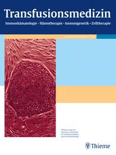
Transfusionsmedizin
Scope & Guideline
Transforming transfusion medicine with vital research contributions.
Introduction
Aims and Scopes
- Transfusion Safety and Efficacy:
The journal emphasizes studies that assess the safety and efficacy of blood products and transfusion practices, including pathogen reduction technologies and transfusion strategies in various clinical settings. - Innovations in Cellular Therapies:
A significant focus is placed on advancements in cellular therapies, including CAR-T cell therapies and stem cell transplantation, exploring their applications and implications for patient care. - Immunohematology and Antibody Detection:
Research related to immunohematology, including the detection of blood group antibodies and alloimmunization, is a core area, addressing the complexities of blood compatibility. - Clinical Guidelines and Best Practices:
The journal serves as a platform for developing and disseminating clinical guidelines and best practices in transfusion medicine, ensuring that practitioners are informed of the latest evidence-based approaches. - Emerging Infectious Diseases and Blood Safety:
It addresses the impact of emerging infectious diseases on blood safety, including the use of convalescent plasma for treating COVID-19 and other viral infections. - Patient-Centered Research:
There is a growing emphasis on research that considers patient outcomes, quality of life, and personalized medicine approaches in transfusion practices.
Trending and Emerging
- CAR-T Cell Therapy and Immunotherapy:
There is an increasing number of studies focused on CAR-T cell therapy, reflecting a growing interest in immunotherapy as a transformative approach for treating various hematological conditions. - Impact of COVID-19 on Transfusion Practices:
Research examining the effects of the COVID-19 pandemic on transfusion practices, including the use of convalescent plasma and adaptations in donor safety protocols, has surged in relevance. - Genetic and Genomic Approaches in Transfusion Medicine:
Emerging themes include the application of genetic and genomic technologies for better understanding blood group genetics, alloimmunization, and tailored therapies. - Patient-Centric Approaches and Quality of Life:
There is a noticeable trend towards incorporating patient perspectives in transfusion medicine research, focusing on quality of life and patient-reported outcomes. - Pathogen Reduction Technologies:
Innovations in pathogen reduction technologies are increasingly prominent, addressing safety concerns and enhancing the quality of blood products.
Declining or Waning
- Traditional Blood Component Processing Methods:
With the rise of new technologies and methods, traditional blood processing techniques are receiving less attention as researchers explore more innovative approaches to improve safety and efficacy. - General Blood Donation Practices:
There appears to be a waning interest in studies focused solely on general blood donation practices, as more specific and advanced topics related to transfusion medicine take precedence. - Historical Perspectives on Transfusion Medicine:
Research articles that provide historical insights into transfusion medicine are becoming less frequent, as the emphasis shifts towards contemporary and future-oriented research. - Non-specific Transfusion Reactions:
The frequency of studies focusing on non-specific transfusion reactions has decreased, possibly due to improved safety measures and better understanding of transfusion-related complications. - Regulatory Frameworks for Blood Products:
While still relevant, there is less emphasis on discussing regulatory frameworks for blood products compared to the past, as the focus shifts towards practical applications and clinical outcomes.
Similar Journals
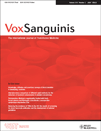
VOX SANGUINIS
Advancing Hematology Through Innovative ResearchVOX SANGUINIS is a distinguished peer-reviewed journal in the fields of Hematology and Medicine, published by Wiley, a leading academic publisher based in the United Kingdom. With a rich history dating back to its inception in 1952, this journal has consistently provided a platform for innovative research and insightful reviews, advancing the understanding of blood-related disorders and therapies. As evidenced by its robust performance—ranking #57 out of 137 in Scopus for Medicine in Hematology and holding a Q2 classification in both Hematology and miscellaneous Medicine categories—VOX SANGUINIS is recognized for its significant contributions to the scientific community. This journal serves as a vital resource for researchers, professionals, and students alike, fostering knowledge exchange and collaboration within the field. With its ongoing commitment to quality and integrity, VOX SANGUINIS continues to shape the future of hematological research well into 2024 and beyond.

Blood Transfusion
Enhancing Lives Through Blood Transfusion Innovations.Blood Transfusion is a leading journal in the fields of Hematology, Immunology, and Medicine, published by SIMTIPRO SRL in Italy. With its ISSN 1723-2007, the journal has established a significant presence in the academic community, as evidenced by its positioning within the Q2 category in Hematology and Medicine (miscellaneous) and Q3 in Immunology and Allergy for 2023. Notably, it ranks #38 out of 137 in the Hematology category, showcasing its impactful contributions to research and practice. Operating under a traditional publishing model, this journal provides valuable insights into advances in blood transfusion science, ultimately aimed at enhancing patient care and outcomes. Spanning from 2003 to 2024, the scope of Blood Transfusion covers a wide range of topics related to hematological and immunological research, making it an essential resource for researchers, healthcare professionals, and students engaged in these critical fields.
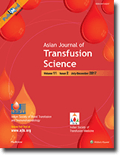
Asian Journal of Transfusion Science
Advancing transfusion science for a healthier tomorrow.Asian Journal of Transfusion Science, published by WOLTERS KLUWER MEDKNOW PUBLICATIONS, is a prominent open-access journal dedicated to the interdisciplinary fields of hematology and immunology. With an ISSN of 0973-6247 and E-ISSN 1998-3565, it serves as a crucial platform for researchers, clinicians, and students from around the globe, facilitating the dissemination of high-quality, peer-reviewed research. Established in 2007, the journal has consistently aimed to advance scientific knowledge in transfusion practices, enhancing patient care and safety in transfusion medicine. Despite its recent categorization in the Q4 quartile within both Hematology and Immunology, the journal is making strides toward greater visibility in the academic community, with plans for expanded reach and increased citation impact. With its commitment to open-access publishing, the Asian Journal of Transfusion Science ensures that invaluable research findings are readily accessible to all stakeholders, thereby bolstering collaborative efforts in transfusion science and related disciplines.
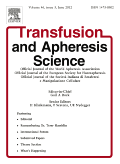
TRANSFUSION AND APHERESIS SCIENCE
Empowering Research for Enhanced Patient Outcomes in HematologyTRANSFUSION AND APHERESIS SCIENCE, published by Pergamon-Elsevier Science Ltd, serves as a pivotal platform for researchers and practitioners in the fields of hematology, transfusion medicine, and apheresis. With an ISSN of 1473-0502 and an E-ISSN of 1878-1683, this peer-reviewed journal boasts a respectable Q3 ranking in the Hematology category as of 2023, positioning it within the 45th percentile among its counterparts. Operating from the United Kingdom, it provides comprehensive insights into the latest advancements and methodologies in transfusion practices and apheresis technology, crucial for enhancing patient care and therapeutic strategies. The journal's scope, covering key developments from 1996 to 2024, allows for a deep exploration of historical and emerging trends within the discipline. Moreover, its open access options facilitate widespread dissemination of research findings, fostering collaboration and innovation in the scientific community. For those dedicated to advancing knowledge in hematology, TRANSFUSION AND APHERESIS SCIENCE represents an essential resource, bridging theory and practice in this vital area of healthcare.
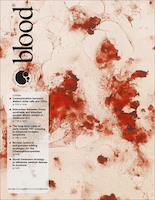
BLOOD
Fostering Groundbreaking Research in Hematology.BLOOD, published by the American Society of Hematology, is a premier peer-reviewed journal in the fields of Biochemistry, Cell Biology, Hematology, and Immunology. With an impressive impact factor and ranking in the top quartiles (Q1) across multiple disciplines, BLOOD is essential reading for researchers and professionals seeking to stay updated on the latest advancements in hematology and related fields. The journal has been a cornerstone of hematological research since its inception in 1946, providing a platform for rigorous scientific inquiry and discourse. Its commitment to publishing high-quality original research, comprehensive reviews, and insightful editorials makes it a vital resource for students, practitioners, and scientists alike. By offering exceptional access to influential publications, BLOOD continues to shape the future of hematology and enhance understanding of blood-related disorders, marking its vital role in advancing both basic and clinical research.
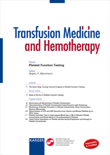
TRANSFUSION MEDICINE AND HEMOTHERAPY
Pioneering discoveries in transfusion medicine since 1973.TRANSFUSION MEDICINE AND HEMOTHERAPY, published by KARGER, is a prominent journal dedicated to advancing the fields of hematology and transfusion medicine. With an ISSN of 1660-3796 and E-ISSN 1660-3818, this esteemed journal has been a valuable resource for researchers and clinicians since its inception in 1973, with significant publication phases continuing into 2024. It currently holds a Q2 ranking in Hematology and a Q3 ranking in Immunology and Allergy, reflecting its impact and relevance in these critical fields. The journal features original articles, reviews, and clinical studies, presenting cutting-edge research that aids in the development of effective therapies and enhances patient care. Open access options are available, ensuring that crucial findings are accessible to a broad audience. As an important platform for dialogue and advancement in transfusion science, TRANSFUSION MEDICINE AND HEMOTHERAPY supports the global health community's efforts to improve treatment outcomes and foster innovation in medical practices.

GEMATOLOGIYA I TRANSFUZIOLOGIYA
Transforming Insights into Lifesaving PracticesGEMATOLOGIYA I TRANSFUZIOLOGIYA is an esteemed journal published by the MINISTERSTVO ZDRAVOOKHRANENIYA in the Russian Federation, focusing on the vital fields of hematology and transfusion medicine. With a rich history dating back to its inception in 1983, the journal plays a significant role in disseminating critical research and advancements in these areas, particularly relevant given the evolving landscape of medical science. As a recognized publication, it is indexed in Scopus and holds a Q4 category ranking in Hematology for 2023, reflecting its niche but important contributions to the field. Researchers, healthcare professionals, and students can look forward to a variety of peer-reviewed articles that not only address contemporary issues but also pave the way for innovative practices in hematology. Although it does not currently offer open access, the journal remains a valuable resource for those seeking to stay informed about the latest findings and developments.
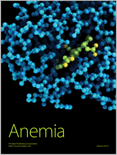
Anemia
Innovating the understanding of anemia through high-quality research.Anemia is a distinguished open-access journal published by HINDAWI LTD, focusing on the intricate and vital field of hematology and related disciplines. Since its inception in 2010, this journal has been dedicated to advancing our understanding of blood disorders, with a particular emphasis on anemia, through the dissemination of high-quality research that is freely accessible to a global audience. The journal's evolving scope from its founding through 2024 embodies its commitment to include the latest breakthroughs and methodologies in cell biology and hematological research. With its presence in prestigious databases and a tiered ranking that places it in the Q3 category in Hematology and Q4 in Cell Biology as of 2023, Anemia serves as an invaluable resource for researchers, clinicians, and students alike. The journal is indexed with a respectable position in Scopus, ranking 52 out of 137 in Hematology, highlighting its growing influence in the medical and scientific communities. With continued emphasis on open access, Anemia not only fosters collaborative research but also ensures that crucial findings reach those who need them most, enhancing educational outcomes and clinical practices worldwide.

Journal of Hematology
Pioneering Discoveries in Blood HealthThe Journal of Hematology, published by ELMER PRESS INC, serves as a pivotal platform for disseminating cutting-edge research in the field of hematology. With an ISSN of 1927-1212 and an E-ISSN of 1927-1220, this journal is committed to advancing scientific knowledge and clinical practice through high-quality peer-reviewed articles encompassing all aspects of blood disorders, from basic science to health policy implications. While the journal currently operates under a traditional access model, it nonetheless prioritizes the rapid publication of significant findings, ensuring that researchers, clinicians, and students have timely access to the latest advancements in hematological research. Positioned to bridge gaps in knowledge and foster collaboration among scholars worldwide, the Journal of Hematology is an essential resource for anyone invested in this vital area of medicine.
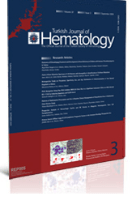
Turkish Journal of Hematology
Innovating knowledge in the field of hematology since 1999.Turkish Journal of Hematology is an esteemed publication dedicated to advancing the field of hematology, producing influential research since its inception in 1999 under the auspices of GALENOS PUBL HOUSE. With an Open Access model, it facilitates widespread dissemination of knowledge, allowing researchers, clinicians, and students to stay abreast of the latest developments in blood disorders and treatments. With an ISSN of 1300-7777 and an E-ISSN of 1308-5263, the journal holds a commendable position in the academic community, evidenced by its 2023 Q3 ranking within the hematology category and its standing at #80 out of 137 in the Scopus database, placing it in the 41st percentile. Covering a wide scope of topics within hematology, this journal serves as a critical resource for disseminating innovative research and clinical practices pertinent to the ongoing challenges faced in this vital area of medicine. With its continuous publication until 2024, Turkish Journal of Hematology remains a beacon for enhancing the understanding and treatment of hematological conditions within the Turkish and global medical communities.